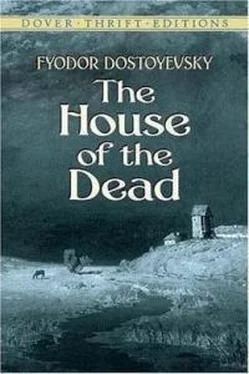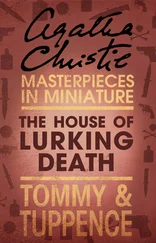"J—ski," said he, "I've done you wrong; I had you beaten for nothing. I'm very sorry. Do you understand? I'm very sorry. I, Major ―"
J—ski answered that he understood perfectly.
"Do you understand? I, who am set over you, I have sent for you to ask your pardon. You can hardly realise it, I suppose. What are you to me, fellow? A worm, less than a crawling worm; you're a convict, while I, by God's grace, [11] Our Major was not the only officer who spoke of himself in that lofty way; a good many officers did the same, men who had risen from the ranks chiefly.
am a Major; Major ―, do you understand?"
J—ski answered that he quite well understood it all.
"Well, I want to be friends with you. But can you appreciate what I'm doing? Can you feel the greatness of soul I'm showing—feel and appreciate it? Just think of it; I, I, the Major!" etc. etc.
J—ski told me of this scene. There was, then, some human feeling left in this drunken, unruly, and tormenting brute. Allowing for the man's notions of things, and feeble faculties, one cannot deny that this was a generous proceeding on his part. Perhaps he was a little less drunk than usual, perhaps more; who can tell?
The Major's glorious idea of marrying came to nothing; the rooms got all their bravery, but the wife was not forthcoming. Instead of going to the altar in that agreeable way, he was pulled up before the authorities and sent to trial. He received orders to send in his resignation. Some of his old sins had found him out, it seems; things done when he had been superintendent of police in our town. This crushing blow came down upon him without notice, quite suddenly. All the convicts were greatly rejoiced when they heard the great news; it was high day and holiday all through the jail. The story went abroad that the Major sobbed, and cried, and howled like an old woman. But he was helpless in the matter. He was obliged to leave his place, sell his two gray horses, and everything he had in the world; and he fell into complete destitution. We came across him occasionally afterwards in civilian, threadbare clothes, and wearing a cap with a cockade; he glanced at us convicts as spitefully and maliciously as you please. But without his Major's uniform, all the man's glory was gone. While placed over us, he gave himself the airs of a being higher than human, who had got into coat and breeches; now it was all over, he looked like the lackey he was, and a disgraced lackey to boot.
With fellows of this sort, the uniform is the only saving grace; that gone, all's gone.
A little while after the Major resigned, our prison was subjected to a thorough reorganization. The "hard labour" hitherto inflicted, and the other regulations, were abolished, and the place put upon the footing of the military convict establishments of Russia. As a result of this, prisoners of the second category were no longer sent there; this class was, for the future, to be composed of prisoners who were regarded as still on the military footing, that is to say, men who, in spite of sentence, did not forfeit for ever their civic status . They were soldiers still, but had undergone corporal punishment; they were sentenced for comparatively short periods, six years at most; when they had served their time, or in case of pardon, they went into the ranks again, as before. Men guilty of a second offence were sentenced to twenty years of imprisonment. Up to the time I speak of, we had a section of soldier–prisoners among us, but only because they did not know where else to dispose of them. Now the place was to be occupied by soldiers exclusively. As to the civilian convicts, who were stripped of all civic rights, branded, cropped, and shaven, these were to remain in the fortress to finish their time; but as no fresh prisoners of this class were to come in, and those there would get their discharge successively, at the end of ten years there would be no civilian convicts left in the place, according to the arrangements. The line of division between the classes of prisoners there was maintained; from time to time there came in other military criminals of high position, sent to our place for security, before being forwarded to Eastern Siberia, for the more aggravated penalties that awaited them there.
There was no change in our general way of life. The work we had to do and the discipline observed were the same as before; but the administrative system was entirely altered, and made more complex. An officer, commandant of companies, was assigned to be at the head of the prison; he had under his orders four subaltern officers who mounted guard by turns. The "invalids" were superseded by twelve non–commissioned officers, and an arsenal superintendent. The convicts were divided into sections of ten, and corporals chosen among them; the power of these over the others was, as may be supposed, nominal. As might be expected, Akim Akimitch got this promotion.
All these new arrangements were confided to the Governor to carry out, who remained in superior command over the whole establishment. The changes did not go further than this. At first the convicts were not a little excited by this movement, and discussed their new guardians a good deal among themselves, trying to make out what sort of fellows they were; but when they saw that everything went on pretty much as usual they quieted down, and things resumed their ordinary course. We had got rid of the Major, and that was something; everybody took fresh breath and fresh courage. The fear that was in all hearts grew less; we had some assurance that in case of need we could go to our superiors and lodge our complaint, and that a man could not be punished without cause, and would not, unless by mistake.
Brandy was brought in as before, although we had subaltern officers now where "invalids" were before. These subalterns were all worthy, careful men, who knew their place and business. There were some among them who had the idea that they might give themselves grand airs, and treat us like common soldiers, but they soon gave it up and behaved like the others. Those who did not seem to be well able to get into their heads what the ways of our prison really were, had sharp lessons about it from the convicts themselves, which led to some lively scenes. One sub–officer was confronted with brandy, which was of course too much for him; when he was sober again we had a little explanation with him; we pointed out that he had been drinking with the prisoners, and that, accordingly, etc. etc.; he became quite tractable. The end of it was that the subalterns closed their eyes to the brandy business. They went to market for us, just as the invalids used to, and brought the prisoners white bread, meat, anything that could be got in without too much risk. So I never could understand why they had gone to the trouble of turning the place into a military prison. The change was made two years before I left the place; I had two years to bear of it still.
I see little use in recording all I saw and went through later at the convict establishment day by day. If I were to tell it all, all the daily and hourly occurrences, I might write twice or thrice as many chapters as this book ought to contain, but I should simply tire the reader and myself. Substantially all that I might write has been already embodied in the narrative as it stands so far; and the reader has had the opportunity of getting a tolerable idea of what the life of a convict of the second class really was. My wish has been to portray the state of things at the establishment, and as it affected myself, accurately and yet forcibly; whether I have done so others must judge. I cannot pronounce upon my own work, but I think I may well draw it to a close; as I move among these recollections of a dreadful past, the old suffering comes up again and all but strangles me.
Читать дальше












